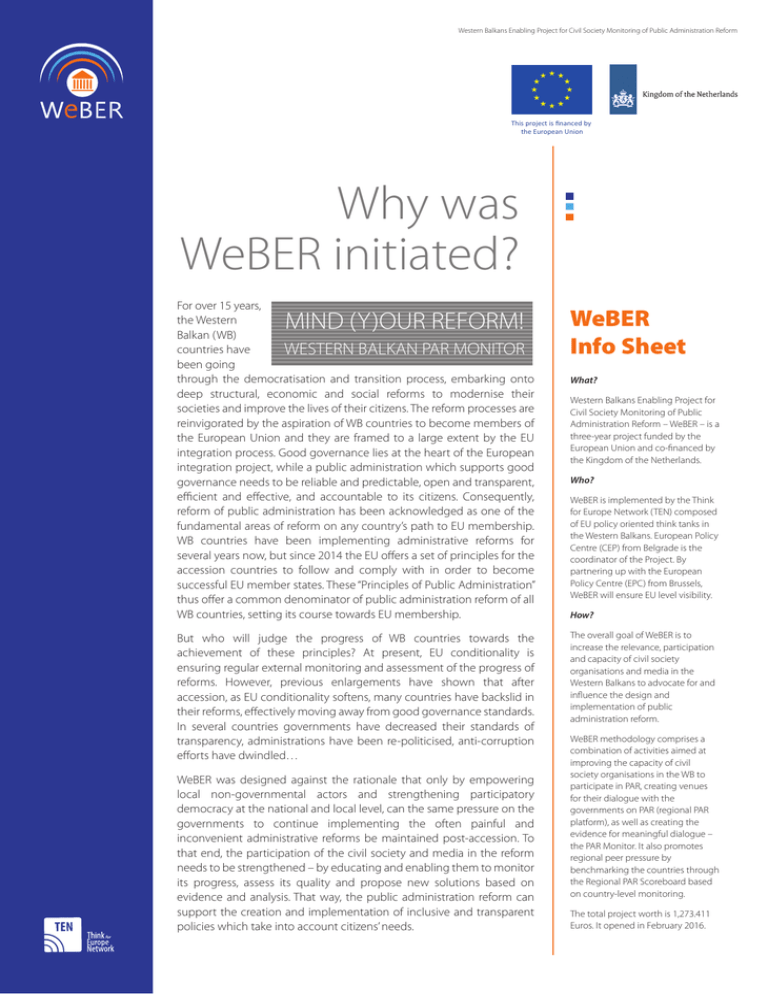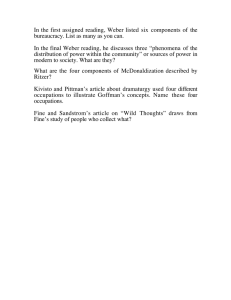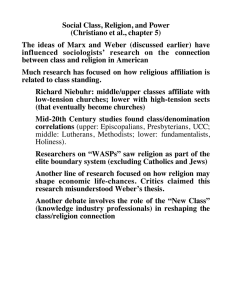WeBER Info Sheet
advertisement

Western Balkans Enabling Project for Civil Society Monitoring of Public Administration Reform This project is financed by the European Union Why was WeBER initiated? For over 15 years, the Western Balkan (WB) countries have WESTERN BALKAN PAR MONITOR been going through the democratisation and transition process, embarking onto deep structural, economic and social reforms to modernise their societies and improve the lives of their citizens. The reform processes are reinvigorated by the aspiration of WB countries to become members of the European Union and they are framed to a large extent by the EU integration process. Good governance lies at the heart of the European integration project, while a public administration which supports good governance needs to be reliable and predictable, open and transparent, efficient and effective, and accountable to its citizens. Consequently, reform of public administration has been acknowledged as one of the fundamental areas of reform on any country’s path to EU membership. WB countries have been implementing administrative reforms for several years now, but since 2014 the EU offers a set of principles for the accession countries to follow and comply with in order to become successful EU member states. These “Principles of Public Administration” thus offer a common denominator of public administration reform of all WB countries, setting its course towards EU membership. WeBER Info Sheet But who will judge the progress of WB countries towards the achievement of these principles? At present, EU conditionality is ensuring regular external monitoring and assessment of the progress of reforms. However, previous enlargements have shown that after accession, as EU conditionality softens, many countries have backslid in their reforms, effectively moving away from good governance standards. In several countries governments have decreased their standards of transparency, administrations have been re-politicised, anti-corruption efforts have dwindled… The overall goal of WeBER is to increase the relevance, participation and capacity of civil society organisations and media in the Western Balkans to advocate for and influence the design and implementation of public administration reform. MIND (Y)OUR REFORM! WeBER was designed against the rationale that only by empowering local non-governmental actors and strengthening participatory democracy at the national and local level, can the same pressure on the governments to continue implementing the often painful and inconvenient administrative reforms be maintained post-accession. To that end, the participation of the civil society and media in the reform needs to be strengthened – by educating and enabling them to monitor its progress, assess its quality and propose new solutions based on evidence and analysis. That way, the public administration reform can support the creation and implementation of inclusive and transparent policies which take into account citizens’ needs. What? Western Balkans Enabling Project for Civil Society Monitoring of Public Administration Reform – WeBER – is a three-year project funded by the European Union and co-financed by the Kingdom of the Netherlands. Who? WeBER is implemented by the Think for Europe Network (TEN) composed of EU policy oriented think tanks in the Western Balkans. European Policy Centre (CEP) from Belgrade is the coordinator of the Project. By partnering up with the European Policy Centre (EPC) from Brussels, WeBER will ensure EU level visibility. How? WeBER methodology comprises a combination of activities aimed at improving the capacity of civil society organisations in the WB to participate in PAR, creating venues for their dialogue with the governments on PAR (regional PAR platform), as well as creating the evidence for meaningful dialogue – the PAR Monitor. It also promotes regional peer pressure by benchmarking the countries through the Regional PAR Scoreboard based on country-level monitoring. The total project worth is 1,273.411 Euros. It opened in February 2016. Western Balkans Enabling Project for Civil Society Monitoring of Public Administration Reform Who implements WeBER? WeBER is implemented by six Western Balkan think tank organisations, gathered in the Think for Europe Network – TEN (ten.europeanpolicy.org). European Policy Centre (CEP), Belgrade is the Secretariat of the TEN and coordinator of the WeBER project. EPC Brussels is the EU partner, in charge of supporting the development of the TEN network and increasing the project visibility at the EU level. The entire WeBER partnership structure is shown on the image below P E C DE A BELGR RG.RS EUROPEAN POLICY INSTITUTE SK OPJE EPI.O RG.MK CEP.O CY OLI NP E G I E V FOR ITIATI IN AJEVO A SAR VPI.B EPC US BR SELS EPC.EU THINK FOR ORK EUROPE NETW TEN INSTITUTE FOR DEMOCRACY AND MEDIATION TIRANA IDMALBANIA.ORG UTE INSTIT IVE NAT ALTER CA ORI RG PODGERN ATIVA.O UT-ALT INSTIT GROUP FOR LEGAL AND POLITICAL STUDIES PRISTINA LEGALPOLITICALSTUDIES.ORG Who do we cooperate with? WeBER has established cooperation (through the associate role in the project) with PAR ministries and/or offices in each of the WB countries. At the regional level, the Project cooperates with the Regional School of Public Administration (ReSPA), which will host the regional PAR platform of civil society organisations through which WeBER will conduct regional dialogue on PAR. It also cooperates with the Regional Cooperation Council (RCC), to ensure complementarities with the monitoring approaches by the civil society focusing on the SEE2020 strategy. The Project also keeps close contact and consults with the SIGMA programme of the OECD which performs regular assessments of the WB countries’ progress in the implementation of the Principles of Public Administration in the period leading up to EU accession. Finally, WeBER consults with the DG NEAR of the European Commission, including the Centre of Thematic Expertise (COTE) on PAR. Furthermore, the Project will establish strong cooperation and alliances with civil society organisations interested in or already working on PAR in all WB countries. By developing a communication strategy for the civil society engagement in PAR monitoring, WeBER will facilitate a more coordinated and complementary approach of various CSOs in their efforts and projects focusing on administrative reform. ten@europeanpolicy.org www.europeanpolicy.org www.par-monitor.org Project Coordinator

